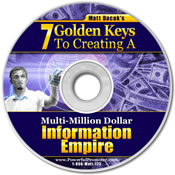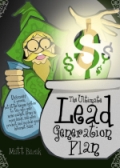 Business Plan Basics
Business Plan BasicsTap these treasures of ideas. The best money you can spend is money invested in your business plan education. Don't shortchange yourself when it comes to investing in your dream. Start gathering samples of business plans and collect business plan books and get a business plan library started; it can change your future. Here's what your library needs to show: that you're a serious student of business strategy and planning, finance and economics, selling, and writing.
If you are just starting a company and looking for funding, or looking for additional funding for growth, you will need to develop a traditional business plan. Creating a business plan is a business hurdle that entrepreneurs seem to dread. Do you do it yourself? Do you hire someone to do it? How do you get it done quickly, but without spending too much money on it? Will what you do yourself be adequate to get funding?
In this article I will discuss the pros and cons of do-it-yourself business planning versus having a business planning consultant do it for you or with you.
The Do It Yourself Business Plan
Particularly if you are seeking capital of less than $200,000, consider creating the plan yourself after taking a class or reading some books or getting some coaching for someone who has written successful business plans.
Consider taking a three-hour business planning class through SCORE or the local Small Business Development Center. Even if you decide afterwards not to write your own plan, you will have a much better idea of what you want out of the process and what to expect.
There are some good reasons for an entrepreneur to do the business plan:
First of all, because you can. If you’ve read sample business plans and find their accounting jargon intimidating, you are not alone. But as long as you can clearly get your message across and have other people such as you accountant look at the plan before it goes to lenders or others, you can do this work yourself.
It is in learning the business planning process that you develop analytical thinking skills necessary to run your business with an intimate understanding of your own business model. Going through the planning process is an invaluable business experience.
You need to know the plan inside and out and really understand the variables involved. You are the one who will be asked the tough questions by potential investors or lenders, such as “What will you do if only half your expected revenue comes in?” or “What will you do if you find out that direct mail is not working for you as your primary marketing tool?”
Outsourcing the Business Plan Process
Entrepreneurs are fire fighters. One of the most important jobs of an entrepreneur is to manage time, and do those things that you are best skilled to do. Many entrepreneurs decide to hire someone else to do their business plans, often because they have an urgent need for the funding and can’t afford the learning curve to be able to develop a high-quality plan that will meet the needs of lenders or investors.
In addition, if your funding requirements are more than $500,000 my recommendation is to get some professional help with this project, even if you do some of it yourself.
Some reasons to consider hiring a consultant:
- It will get done! Business planning is done much faster with someone who knows the process. Every entrepreneur has good intentions about getting plans completed, but months later they still haven’t done all the work. Planning should be high priority work, but it is hard to get to when customer calls and employee problems require immediate attention. The sooner the plan is completed, the sooner funding can be attained. And the price of hiring the consultant will be small in comparison with the increases in growth and profitability of the business.
- It will get done in a way financial professionals will respect. Business planning is done better by someone who knows how finance people look at plans and what they will and won’t question. Once you’ve been through the business plan process many times, you know what it takes to get funding - what to emphasize and what to play down.
- The consultant’s objectivity will allow for non-emotionally-based projections and expectations for the business. A consultant will be much more objective in the process and question your assumptions, making it less likely that the business will have problems after the funding comes in.
No matter what, don’t let a business planning consultant talk you into putting any information into your plan that you aren’t comfortable with. If it doesn’t look right to you, it probably isn’t. It is your business, and you will be stuck with the plan long after you’ve paid the consultant’s bill. Make sure it is the plan that you want, one that matches your goals and objectives, and captures the way you look at business and the spirit of your company.
If you do decide to hire a business planning consultant, here are some of the important questions to ask to make sure you get the greatest value from your investment:
- How many business plans have you written for my type of business? How many of them were funded?
- How much time will you need of mine during the planning process?
- When will the plan be completed, and how many drafts should I expect to see and have the opportunity to comment on?
- Will you be writing the plan yourself or do you have associates who do the work with you?
- Will there be an opportunity for you to present the plan or for me to present the plan to my other advisors before the final draft is done?
- How do you work in collaboration with my partners and advisors so their input is taken into consideration during the writing of the plan?
- Do you do the market research and the financial spreadsheets, or are those things done separately (and charged for separately)?
- Does your price include revisions or customization for certain types of funding (to include different information needed by investors versus lenders)?
- Does your price include coaching to prepare me to talk with lenders or make financing presentations?
- Will I have an electronic version as well as a hard copy version of the final plan (so I can make changes later if I need to)?
The Optimum Solution: A Blended Approach
At best, the planning process should not be at either end of the spectrum, but squarely in the middle. In my experience, plans that win funding come from a true collaboration between a skilled consultant/facilitator and the entrepreneur’s team of employees and advisors.
A business planning consultant can act as a coach, first assessing the job to be done, and then recommending who is best to do it. The business plan should be a compilation of work between the vision and goals of the entrepreneur, the technical understanding and expertise of his or her accountant and other professionals, a consensus of employees or others, and the research and writing abilities of the business planning consultant. The consultant should meet with all parties involved, talk about what is needed for the plan, and use all the resources available to get the work done as quickly and cost effectively as possible. It is the consultant’s responsibility in the process to take all the pieces and make the final plan into a readable, accessible document that will stand up to investor/lender scrutiny.
My final caveats:
Don’t pay more than a few thousand dollars for a plan unless you are looking for capital of well over $1 million. I have heard more than a few horror stories by people who have hired university professors assuming they are the experts (they aren’t) and paying tens of thousand of dollars for a poorly written or incomplete plan. Ask your banker for business planning consultant recommendations, or better yet, talk with someone who had a good experience having a business plan written for them. It is reasonable for a consultant to expect you to pay half of the fee up front and the other half at the completion of the plan. And you can’t hold the consultant responsible if you don’t get funding based on the plan – too much is based on your own credit and management skills.
Don’t expect to get a finished plan that is a roadmap of everything you need to do to have a successful business. That isn’t the purpose of the business planning process. A traditional business plan is intended only to document your strategies for the business very briefly – but well enough to get funding. If you are hoping for something that will tell you how to market or how many people you need to hire, you will have to start with a deep strategic planning process, and probably buy lots of consulting time to get you going.
Don’t expect a great a business plan from a poor business model. If your costs are too high to make your business profitable, the business planning process will help you discover that. Then it will be up to you to make the hard decisions about changing your costs structure to make the business work. The business planning consultant is a skilled professional, not a miracle worker. A good business plan can help you highlight your strengths and minimize your weaknesses, but it cannot make an unworkable business model into a thriving business.
And one final thought: Don’t go on to start a business or make changes in your current business if everything in the business planning process tells you it won’t work. Things don’t get better out in the real world if they don’t work on paper. Deal with the weaknesses – get more training, consider product redevelopment, or have a home-based business to reduce costs until you can sustain the rent for an office. Businesses fail finally because they’ve run out of money. If your plan tells you that you can’t make enough money to make the business work for the long run, pay attention to that reality.
Marketing Tips Provided to You by:
Matt Bacak, The Powerful Promoter
Author of Powerful
Promoting Tips


























































































